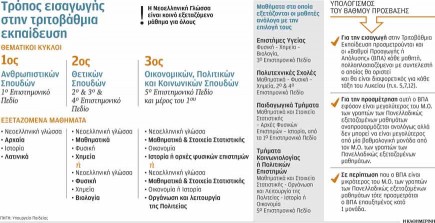“Ο θεσμός των πανελλαδικών εξετάσεων για την πρόσβαση στην τριτοβάθμια εκπαίδευση είναι ένας από τους ελάχιστους αντικειμενικούς και αδιάβλητους θεσμούς της ελληνικής κοινωνίας και ένα από τα βασικά αιτήματα της κοινωνίας είναι αφενός η διατήρηση της αντικειμενικότητας και του αδιάβλητου του θεσμού και αφετέρου η διευκόλυνση γονέων και μαθητών να κάνουν τις καλύτερες δυνατές επιλογές στο λύκειο και τη διαδικασία πρόσβασης στην τριτοβάθμια εκπαίδευση.” Ένα σημαντικό άρθρο- παρέμβαση του Γρηγόρη Κωνσταντόπουλου στη δημόσια διαβούλευση στο www.ekp.gr στη στήλη “Ενδιαφέρουν” με τίτλο “το Αδιάβλητο και οι Στρεβλώσεις …” το οποίο αναλύει με εύστοχες παρατηρήσεις πτυχές του νομοσχεδίου οι οποίες άπτονται του αδιάβλητου των εξετάσεων . Η δημόσια διαβούλευση συνεχίζεται μέχρι την ερχόμενη Τετάρτη και όπως έχουμε ξαναγράψει η συμμετοχή είναι μεγάλη και σε διαφορετικό μήκος κύματος από τις ξύλινες θέσεις των Συντεχνιών . Παρέμβαση δημόσια με κριτική υποστήριξη σε όλα τα επίπεδα πρέπει να αναλάβει και η συντεταγμένη μας έκφραση στην οποία η Επιτροπή Μορφωτικών Υποθέσεων του Ελληνικού Κοινοβουλίου οφείλει μια πρόσκληση αν επιθυμεί να ακούσει Προτάσεις αντί Συνθημάτων …
Eight Key Competences
This framework defines eight key competences and describes the essential knowledge, skills and attitudes related to each of these. These key competences are:
communication in the mother tongue, which is the ability to express and interpret concepts, thoughts, feelings, facts and opinions in both oral and written form (listening, speaking, reading and writing) and to interact linguistically in an appropriate and creative way in a full range of societal and cultural contexts;
communication in foreign languages, which involves, in addition to the main skill dimensions of communication in the mother tongue, mediation and intercultural understanding. The level of proficiency depends on several factors and the capacity for listening, speaking, reading and writing;
mathematical competence and basic competences in science and technology. Mathematical competence is the ability to develop and apply mathematical thinking in order to solve a range of problems in everyday situations, with the emphasis being placed on process, activity and knowledge. Basic competences in science and technology refer to the mastery, use and application of knowledge and methodologies that explain the natural world. These involve an understanding of the changes caused by human activity and the responsibility of each individual as a citizen;
digital competence involves the confident and critical use of information society technology (IST) and thus basic skills in information and communication technology (ICT);
learning to learn is related to learning, the ability to pursue and organise one’s own learning, either individually or in groups, in accordance with one’s own needs, and awareness of methods and opportunities;
social and civic competences. Social competence refers to personal, interpersonal and intercultural competence and all forms of behaviour that equip individuals to participate in an effective and constructive way in social and working life. It is linked to personal and social well-being. An understanding of codes of conduct and customs in the different environments in which individuals operate is essential. Civic competence, and particularly knowledge of social and political concepts and structures (democracy, justice, equality, citizenship and civil rights), equips individuals to engage in active and democratic participation;
sense of initiative and entrepreneurship is the ability to turn ideas into action. It involves creativity, innovation and risk-taking, as well as the ability to plan and manage projects in order to achieve objectives. The individual is aware of the context of his/her work and is able to seize opportunities that arise. It is the foundation for acquiring more specific skills and knowledge needed by those establishing or contributing to social or commercial activity. This should include awareness of ethical values and promote good governance;
cultural awareness and expression, which involves appreciation of the importance of the creative expression of ideas, experiences and emotions in a range of media (music, performing arts, literature and the visual arts).
Νομοσχέδιο Σκούπα
Με ένα Νομοσχέδιο Σκούπα το Υπουργείο της Παιδείας ανοίγει τη συζήτηση εφ’ όλης της ύλης … Από το Νέο Λύκειο μέχρι τις μετεγγραφές ! Δείτε προσεκτικά τις διατάξεις αλλά και τον οδικό χάρτη της εκπαίδευσης προς την αγορά εργασίας …
Εξετάσεις Κύρους στο Νέο Λύκειο
Τέσσερις φορές από πανελλαδικές εξετάσεις θα περνούν οι μαθητές του Λυκείου στη μαραθώνια προσπάθειά τους να εισαχθούν στην τριτοβάθμια εκπαίδευση. Οι τρεις πρώτες φορές για να προαχθούν από τάξη σε τάξη και να πάρουν το απολυτήριο, και η τελευταία -η τελική, αφού θα έχουν πάρει το απολυτήριο Λυκείου- για να εισαχθούν σε ΑΕΙ. Τα μαθήματα της τελικής εξέτασης εισαγωγής θα είναι 4, όμως για τον υπολογισμό των μορίων θα μετρά και ο βαθμός και των τριών τάξεων. Επίσης, μια σημαντική αλλαγή είναι ότι ο βαθμός από τα προφορικά που θα έχει ο μαθητής σε κάθε μάθημα θα αναπροσαρμόζεται με βάση τον βαθμό που πήρε στο μάθημα στις προαγωγικές και απολυτήριες εξετάσεις. Για τα θέματα των εξετάσεων θα οργανωθεί Τράπεζα Θεμάτων. Αυτά προβλέπει η πρόταση του υπ. Παιδείας, την οποία παρουσιάζει σήμερα η «Κ»… (δείτε το σχετικό ρεπορτάζ)
Προτεινόμενες Αλλαγές & Θερμό Φθινόπωρο
Προτεινόμενες αλλαγές στο Λύκειο
Οι προτεινόμενες αλλαγές που παρουσιάζουμε αποτελούν μια αναδημοσίευση από το εκπαιδευτικό portal www.alfavita.gr . Το Υπουργείο αναμένεται να δώσει στην δημοσιότητα τις προτάσεις του επισήμως την Δευτέρα ! Τώρα ποια Δευτέρα αυτό είναι μια άλλη συζήτηση … Μέχρι τότε ας αρκεσθούμε σε διαρροές και εικασίες . Σε κάθε περίπτωση οι αλλαγές δεν θα είναι το πρώτο θέμα της εκπαιδευτικής συζήτησης του φθινοπώρου το οποίο προβλέπεται … θερμό .





